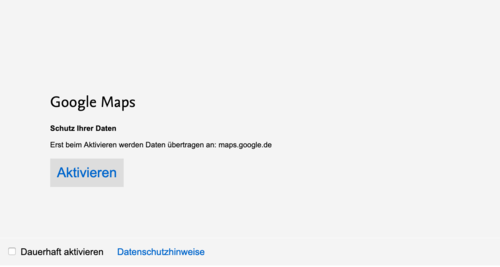§ 7 Map Services
The website of Freie Universität Berlin uses Google Maps to visually depict geographical information. Data on how visitors use the map functions when using Google Maps is collected, processed, and used by Google. You can find further information on the data processing performed by Google in Google’s Privacy Policy. You can also change your data protection settings via the Google Safety Center.
You can find detailed instructions on how to manage your data when using Google products here.
Without additional measures, the map services use technical means that ensure that even when viewing or loading the page using the map, data (including personal data) are exchanged between the original website and the map service (here, Google). In the aforementioned cases, the user has the option to refuse to allow such data to be transmitted.
To protect users of our web pages from this type of exchange of data, which is not subject to our influence, and from the transmission of data to the respective map service, we have incorporated an appropriate technical precaution called the two-step solution. This two-step solution gives users the opportunity, even after loading the service, to agree to the use of the respective map service (and thus to exchange data with this map service). The default setting of the two-step solution does not transmit data to the map service. This option may be decided on a case-by-case or permanent basis. A decision can be subsequently revised. If you do not want a map service to collect information about you via our website, do not activate it by clicking the respective map.
Maps supplied by Google Maps take the form of widgets, an example of which can be seen right.
By clicking the link, you agree to a one-time data exchange between the respective web page domain and Google. No data is transferred to Google by default. To permanently agree to data exchange between the website of a specific domain and the relevant map service, which requires a cookie on our part (see above), you should check the box “Permanently activate.” You can also revise this decision again later.

